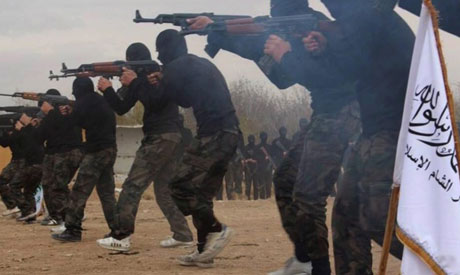
In this undated picture released on Friday Nov. 29, 2013, and posted on the Facebook page of a militant group, members of Ahrar al-Sham brigade, one of the Syrian rebels groups, exercise in a train camp at unknown place in Syria. (Photo:AP)
A Syrian rebel group named a new leader and military chief on Wednesday, less than 24 hours after an explosion killed nearly a dozen of its senior figures in a devastating blow to one of the most powerful factions in the country's armed opposition.
The group, Ahrar al-Sham, has been among the steadiest and most effective forces fighting to oust President Bashar Assad in Syria's civil war. It has also been on the front lines of a now nine-month battle in northern Syria against the extremist Islamic State group.
The deaths of so many of its leaders throws Ahrar al-Sham's future into question, while also laying bare the tangled dynamics of Syria's broader anti-Assad scene just as the United States is considering injecting itself into the country's conflict by going after the Islamic State group. Washington's efforts to crush the extremists could include ramping up support for Syria's rebels.
The U.S. has long looked askance at Ahrar al-Sham, considering the group too radical for Washington's tastes and too cozy with the al-Qaida-linked Nusra Front. For that reason, the limited support Washington has provided so far to rebels was not directed Ahrar al-Sham's way.
But the group managed to fuse its ultraconservative religious views with a more practical political position, allowing it to act as a bridge of sorts between the more moderate Western-backed rebel groups and hard-line factions. And although Washington had qualms about working with the group, Ahrar al-Sham has been a fierce enemy of the Islamic State group, and has lost thousands of men since January fighting the extremists.
The question now is whether Ahrar al-Sham can survive the loss of nearly all of its senior members, including top boss Hassan Aboud. They were killed late Tuesday when an explosion struck a high-level meeting in the town of Ram Hamdan in Syria's Idlib province.
It was not immediately clear who was behind Tuesday's explosion, and there even were conflicting reports on the nature of the blast. The Britain-based Syrian Observatory for Human Rights said it was a car bombing. Ahrar al-Sham's described it as only an explosion.
On Wednesday, a spokesman for the group said in a video statement posted online that Hashem al-Sheik, also known as Abu Jaber, would assume overall leadership of the group, while Abu Saleh Tahan would fill the role of military commander. The spokesman also said Ahrar al-Sham would forge ahead with its fight against Assad as well as the Islamic State group.
In a video posted on the group's YouTube account Wednesday, Abu Jaber eulogized his fallen comrades in eloquent classical Arabic, and urged his fighters to remain steadfast in their mission. He wore a white shirt, and neatly brushed white beard of the sort preferred by deeply conservative Muslims known as Salafis.
Abu Jaber led a rebel brigade in the town of Maskana in northern Syria before his faction was subsumed by Ahrar al-Sham nearly two years ago, according to Aron Lund, author of a report on the group for the Swedish Institute for International Affairs. Abu Jaber later served as a commander of Ahrar al-Sham's eastern forces.
Little more than that is known about either man, and it was not immediately clear what direction they would take the group. The decision will have an impact on the wider rebel scene because Ahrar al-Sham is a leading member of an alliance of seven conservative and ultraconservative rebel groups known as the Islamic Front.
The Islamic Front wants to create an Islamic state in Syria, rejects the Western-backed political opposition in exile but frequently collaborates with mainstream rebel groups that are supported by the U.S. and its allies. In recent months, however, some of the factions within the alliance have adopted a more moderate stance, potentially as a way to curry favor with the U.S. and secure Washington's backing.
Ahrar al-Sham's new leaders could steer the group in that direction, or they could plot a new course more in line with the Nusra Front and other radicals.
Short link: